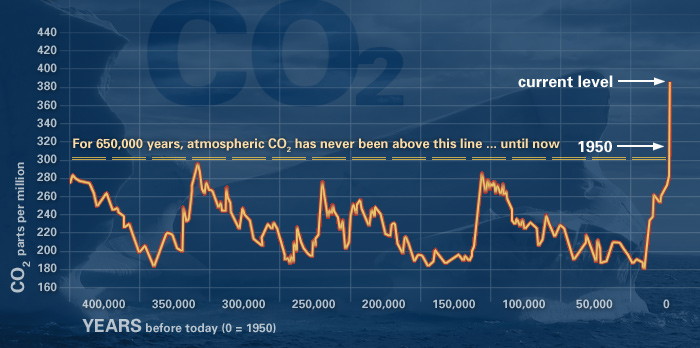
When we experience weather events like hurricanes and floods, it’s very easy for us to feel insignificant and powerless in the face of such massive natural forces. How can humans influence this? Well, yes, we can. Of course we can’t influence a single weather event, but we can and do have a long term influence on the climate that causes it.
Since the industrial revolution, with ever-increasing supplies of fossil fuels, the activities of a dramatically expanding world population have made significant alterations to the make-up of our atmosphere.
In some cases human-caused change is direct and unambiguous. The harmful effect of the human release of CFCs on the ozone layer is well documented and not disputed. Down on the ground, draining of marshland and deforestation can produce a significant decrease in water vapour in the atmosphere downwind; while the introduction of irrigation for agriculture has the opposite effect. Over time, both of these human activities can alter patterns of rainfall, turning deserts into green areas and green areas into deserts.
In other cases the human causes of climate change are more complex. Emissions from cement production, pollution and the release of particulates to form smog in the atmosphere, all affect climate.
Without doubt the most significant of all the human causes of changing climate is the dramatic increase in CO2. After remaining relatively steady for the last 650,000 years or more, in just the last two hundred years the concentration of CO2 in the atmosphere has suddenly shot up from 280, to more than 380 parts per million. And it’s still rising. This dramatic 30% increase has all taken place at the same time as humans have been burning fossil fuels at a greater and greater rate.
Of course there are also natural sources of the CO2 in the atmosphere, such as vegetation, but fortunately there are differences that scientists can measure between the CO2 derived from fossil fuels and the CO2 derived from plants. The changing concentrations of the two types demonstrate that the additional CO2 can only be the result of human activity.

Of course, as CO2 is the most common of greenhouse gasses, the additional concentration is what causes most of the rise in temperature. This is resulting in a change in weather patterns and ocean currents; the melting of global ice formations; and an increase in extreme weather events.
So, yes; though we might be pretty helpless when it comes to controlling the weather, humans are certainly capable of changing the world’s climate.
This post is the Basic version (written by Graham Wayne) of the skeptic argument "Humans are too insignificant to affect climate". We're currently going through the process of writing plain English versions of all the rebuttals to skeptic arguments. It's a big task but many hands make light work. If you're interested in helping with this effort, please contact me.
Posted by John Russell on Thursday, 26 August, 2010
 |
The Skeptical Science website by Skeptical Science is licensed under a Creative Commons Attribution 3.0 Unported License. |